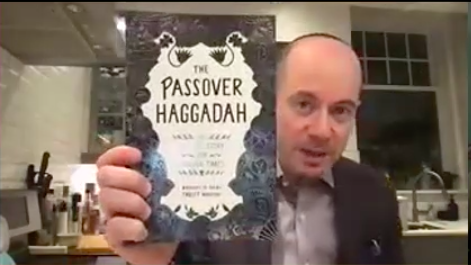Between putting on a seder or two, the dietary changes, and staying focused on all other aspects of the holiday, you might’ve imagined Passover is the kind of Jewish holiday that could use a bootcamp.
So, it was a good time to put one on with Moishe House Maple Leaf Gardens, in which I was joined by my Bonjour Chai co-host Avi Finegold.
MoHo MLG, as we like to call it, has been my home for the past few months in Toronto.
Our crowd of residents and guests has been diverse on so many levels—from observant traditional Jews to interfaith secular ones, with every kind of background including those who converted to Judaism. The one thing they all have in common is the age category: 20s and 30s.
I heard through the grapevine that Avi had experience holding these bootcamp events. My housemates and I thought that our participants could use one, especially after a year or two in which most Passovers were burdened with some form of social distance.
Better still, the Passover Prep Bootcamp leader was the one rabbi I talk to every week.
And in true Avi Finegold style, the Zoom event was inclusive and interactive. We encouraged everyone to bring a glass of wine—although Avi brought a homemade Manhattan cocktail.
Here are the highlights of what we covered in those 90 minutes:
- The history of the seder: For the first thousand years after the Exodus, Passover was a pilgrimage. After the destruction of the second temple, In the period of 70-200 CE, we suddenly had to bring the rituals into the home. The seder as we know it today is heavily influenced by Greek symposiums of that time. Who knew?
- Picking a personalized haggadah: Hot tip! Haggadot.com is where you can select a specific theme (Jews of Colour, history, feminism, LGBTQ+, etc.) and customize your own reader for the seder nights. Avi also shared his very large selection of eclectic ones, including a graphic novel version and a (…wait for it) The Hitler Haggadah, which uses the Holocaust as the backdrop for the story of Passover.
- The essential parts: Avi harped on the importance of asking questions, starting with the most familiar ones early on: the big four. If we skip those and kids aren’t engaged, he feels we’re missing the mark. And while they’re also said in the synagogue throughout the holiday, the recitation of the Hallel prayers are also important for winding down the seder with a bang. (And by bang, I mean ending with praise.)
- What to buy: If you have to purchase one item, make it matzah. Avi ranted for a good while about his distaste for attempts of recreating hametz through overpriced cookies, cakes and rolls. Instead, he suggests looking for recipes in non-Jewish cookbooks that have Passover-friendly ingredients. Avi also suggested making your own personalized items, such as seder plate and matzah cover, which you can use rather than spend exorbitant amounts at a Judaica shop. For the intermediate days, he suggests protein heavy meals, rather than endless matzah. (Hey, it could help with constipation.)
- What to cook: For those leading for the first time, it’s important to make lots of lists and then delegate tasks to your housemates/family members/sous chefs. One main course, a couple of side dishes and a dessert is more than enough for your main meal for a basic seder. What you decide to serve is totally up to you!
The participants also shared their own ways of making Passover unique and relevant to their families, like Ruth’s Mix—a trail mix to represent interfaith families, and how everyone is welcome at the table. Many shared that they include the orange on the seder plate or Miriam’s cup, two of the feminist additions to the holiday.
If a bootcamp can be considered successful when nobody breaks a sweat, then we pulled it off. And, like what we do every week on Bonjour Chai, it was a way for those who feel on the fringes of establishment community events to plug into the fun and excitement of Judaism.
What lockdown taught some artists
My good friends and fellow multidisciplinary actors, Lise Cormier and Kenton Blythe, are putting on a cabaret called What I Learned in Lockdown.
The show features songs, stories and stand-up by them and other talented folks, all based on experiences that they had during the pandemic.
Lise, who grew up in Halifax to an Acadian father and an Ashkenazi mother, was yearning to learn more about her Jewish heritage during the last two years.
I first connected with the couple last spring, before making my move to Toronto. After geekily discussing theatre, it came up in conversation that I was Jewish. Lise got very excited and said she was looking to get more involved in the community.
Soon after, she signed up for a Judaism 101 course at the JCC, and has just finished a beginner Hebrew course.
Lise continues to do self-initiated learning including conversations with her aunt, and attending events in Toronto, which she says has enriched her soul in ways she didn’t expect.
As part of the cabaret, Lise will be weaving in elements of her journey, through Hebrew songs her mother sang to her throughout her life.
What I Learned in Lockdown will take place on April 4 at Wychwood Theatre, in Toronto. Click here for more information and tickets.
Ilana Zackon can be reached at ilanawritesthings[@]gmail.com and found on Facebook and Instagram.
HEAR what else she has to say every week on Bonjour Chai









